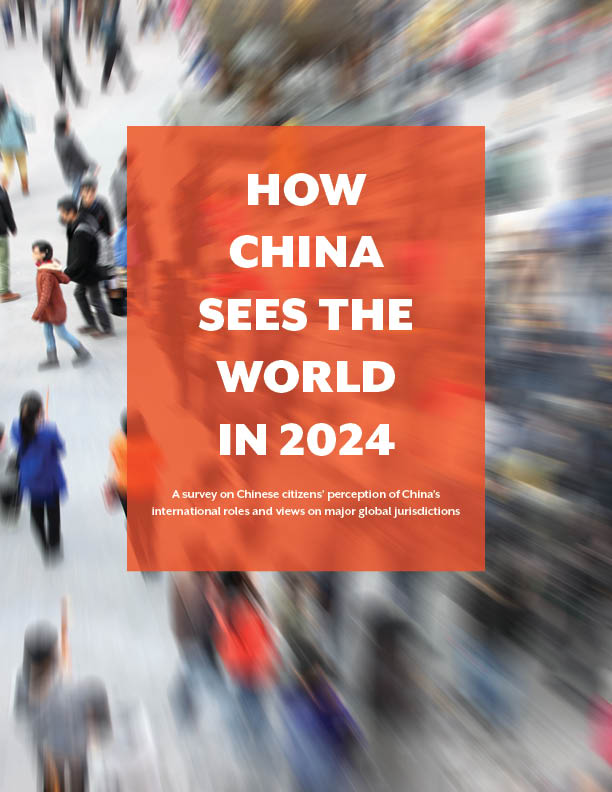How China Sees the World in 2024
Report Summary
China’s relationship with Western jurisdictions have suffered from greater bi-directional tensions in the last year. This trend is exemplified by China’s tacit support for Russia’s ongoing war in Ukraine, its ongoing trade disputes with the United States and the European Union, disputes in the South China Sea, and its reliance on dual-use technologies to promote its military and economic advancement. These developments have led to numerous investigations of China’s trade practices, particularly regarding electric vehicles, export restrictions on semiconductors and other high-end technologies, and the prolonged deployment of military assets in the Indo-Pacific region.
As China’s rise as a major power marks a defining feature of the contemporary global political, economic and security landscape, it remains crucial to focus on Chinese citizens’ perceptions of foreign jurisdictions and issues of global concern. Namely, the Chinese state’s capacity to pursue its interests is intimately tied to the popular legitimacy it is granted by its citizenry. This ultimately means that the general public’s support or dissatisfaction with China’s foreign policy and activities can translate to future support or dissatisfaction with the Chinese government itself.
This report discusses the findings from the second iteration of the Chinese Citizens’ Global Perception Survey (CCGPS). CCGPS 2024 is an online and telephone national survey conducted by the lead author, in cooperation with a survey firm in mainland China, in the first quarter of 2024. It provides a demographically representative and statistically valid, candid account of how the Chinese general public view other nations and their relationships with China. CCGPS 2024 examined mainland Chinese citizens’ perspectives on China’s current relations with global actors, including Australia, Canada, the EU, France, Germany, India, Japan, Russia, the UK and the US. This report discusses the survey findings in five areas: (1) Chinese citizens’ general global perception; (2) China’s global roles; (3) foreign tourism, study, work and emigration preferences; (4) Canada-China relations; and (5) Chinese citizens’ sources and knowledge of global jurisdictions.
This report offers observations and insights into the Chinese public’s views on global relations, and the factors that shape these perceptions. In the same breath, the report points to critical nuances that fashion a greater understanding behind the complexities of everyday Chinese citizens’ thinking. The goal of the report is to provide evidence, rooted in timely data, which can aid key stakeholders to develop targeted and considered strategies for enlighten and productive engagement with mainland China.
Major Findings
Part I: General Global Perception
-
- Chinese citizens perceive China as the most influential global actor, followed closely by the United States, Russia and the EU. Japan, India and Australia were regarded as being amongst the least influential.
- Russia is considered to be the most trusted and important nation to China’s long-term future. Japan and the United States were perceived to be the least trustworthy, with the former being viewed as the least important nation for China’s future.
- Respondents perceive the United States as the actor most likely to engage in military conflict with China. However, this perception does not extend to US-allied nations such as Australia, Canada and the UK. Russia is viewed as the least likely nation to engage in a future military conflict with China.
Part II: China's Global Roles
- Chinese citizens want the People’s Republic of China to take a more active international engagement role. This is a consistent trend across socio-economic lines. The most favourable areas for Chinese global leadership are peace and security, followed by technology and innovation.
- While the Chinese public does not favour decoupling economic and technological ties with Western jurisdictions, there is relatively limited support for expanding technological and economic ties.
- There is a strong and widespread consensus regarding the importance of expanding economic and technological ties with Russia.
Part III: Tourism, Study, Work, and Emigration Preferences
- Despite strained relations with China, Western jurisdictions remain popular destinations for studying, tourism and emigration.
- Respondents have highly favourable views of Russia as a destination for travel, work, and study, although they express less interest in emigration.
- The United Kingdom is the most popular destination for studying abroad, followed closely by Germany, Russia and Australia.
Part IV: Canada and China Relations
- The Chinese public favours expanding ties with Canada, notably in global/regional peace and security initiatives, and cultural exchanges. This was consistently the case in the 2023 iteration of the survey.
- Most Chinese citizens do not believe that Canadians have a good understanding of China.
- The factors that have the greatest impact on Canada-China relations were China’s growing power and Canada’s close relationship with the United States. Cultural and value differences, and Canada’s domestic and foreign policies, are seen to play a lesser role.
Part V: Sources and Knowledge of Global Jurisdictions
- Chinese citizens are more likely to rely on social media than state media (TV, radio, and newspapers) to learn about global jurisdictions. This was consistently the case in the 2023 version of the survey.
- Respondents were highly knowledgeable about the US, Japan and Russia, and less knowledgeable about Canada, Australia and the EU.
- Self-reported higher levels of knowledge of a jurisdiction correlated with higher levels of trust in said jurisdiction.
